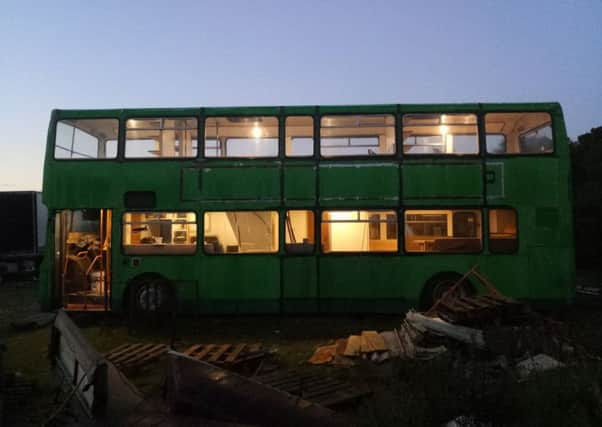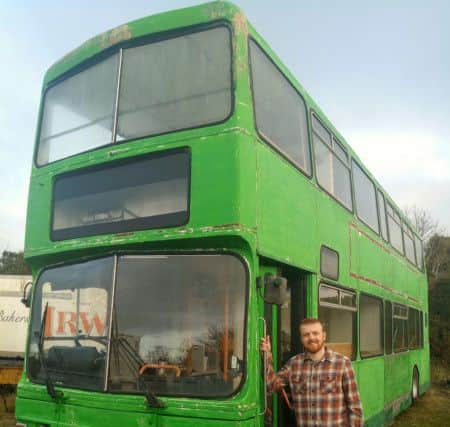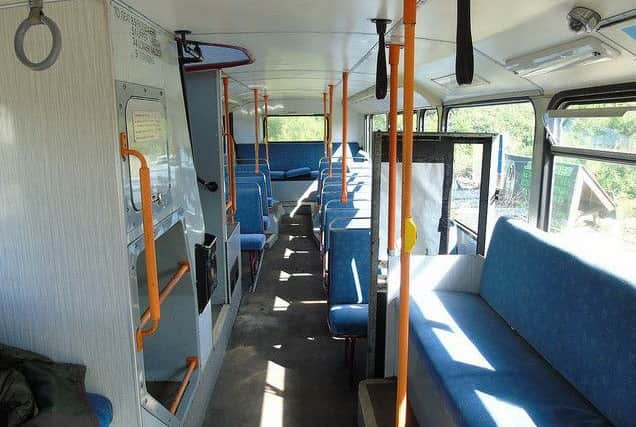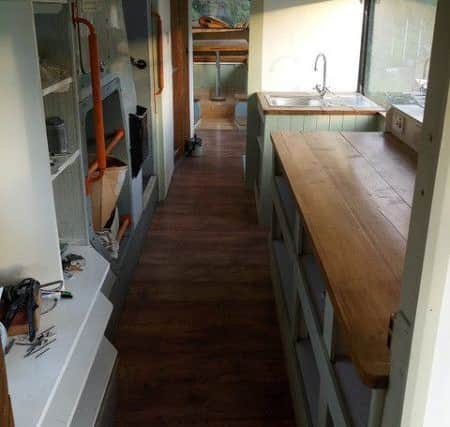Get on board ... for a holiday on a double decker bus


When getting a foot on the property ladder was proving to be too difficult for a 24-year-old Northern Ireland man, he came up with the innovative idea of living in a double decker bus.
Jack McGrath’s plans have since been modified but his dream of converting a once-functional bus into a modern living space is close to being realised.
Advertisement
Hide AdAdvertisement
Hide AdTaking a break from work on the bus, which is currently located on a rental site close to his home in the Saval area of Newry, Jack spoke to the News Letter about how he came to be the owner of a second-hand double decker bus which had previously been used in the Kent area.


He said: “I was originally going to live in it. I was frustrated by housing prices.
“The idea of living in a converted double decker bus was essentially a housing solution.
“I got it off a businessman from just outside Liverpool who was selling them. He brought the bus to Heysham and got it ferried over to Warrenpoint.
“From there it was driven to where it is now.”
Advertisement
Hide AdAdvertisement
Hide Ad

Jack’s plans to live in the bus changed shortly after he began work on the vehicle.
He said: “I’ll be close to the limit of my budget by the end of this first phase so at the moment it seems more feasible to rent it out.”
Jack said the target market would be glampers – a term coined for people who like camping-style trips in more luxurious surrounds than a tent.
He commented: “You would make more from renting it out to holiday makers rather than renting it as an actual dwelling.
Advertisement
Hide AdAdvertisement
Hide Ad

“The requirements for accommodation that is lived in 365 days of the year are very different to somewhere that is rented out for short periods to lots of different people.
“By renting it out to glampers – for example via airbnb – I’d be able to recoup some money and explore other possibilities.
“I’ve looked at other people who have converted buses over in England and they seem to be doing very well with renting them out.
“I might as well give it a go. As far as I’m aware it will be the first converted double decker bus in Ireland so that’s definitely a selling point.”
Advertisement
Hide AdAdvertisement
Hide AdJack – a university student who spent a couple of years working in a power station – said he’d had the bus for around 18 months.
He hopes to have made the vehicle habitable by early next year.
Jack said: “The issue is finding somewhere to put it before finishing it off.
“It’s the land that is the expensive part. That’s more of an issue than the bus conversion itself.
“I’m renting out the yard that it’s in now month by month.
“I don’t have anywhere permanent to put it the moment.
Advertisement
Hide AdAdvertisement
Hide Ad“I’m looking for a site or trying to find someone who wanted to go into partnership and would be interested in putting it on their site.
“Ideally I’d like to have it in a permanent location before starting to rent it out.”
Of the work that has been done on the bus and still needs to be carried out he said: “On the outside I have to take off the advertising sign and repaint it.
“I’m going to keep it the same colour of green.
“Inside I’m keeping some original features like the driver’s seat, steering wheel and dashboard.
Advertisement
Hide AdAdvertisement
Hide Ad“I’ve kept some of the rails people would hold onto when the bus is moving.
“I’ve taken all the seats out and the poles. I’m thinking of maybe using one of the ‘stop’ bells from the poles as a front door bell. I’ve also kept all the seats in storage with a view to do something with them at a later date.”
In terms of new additions he said: “I’ve got the kitchen put in and the beds in. I need to do soft furnishings, carpets, blinds, sofas, etc .
“I need to put in a toilet and a wood burner but I can’t put those in until it’s sited. You couldn’t move it with those fitted. The wood burner would probably be too heavy and the ceramics could break in transport.”
Advertisement
Hide AdAdvertisement
Hide AdJack, who lives with his parents Jim and Liz and his sister Alison, is trying to keep the project environmentally friendly.
He said: “I did Environmental Science at university over in Nottingham.
“After that I worked in a power station for two years doing environmental management.
“I saved up money from that job to be able to do this. I try to be as environmentally conscious as possible. I’ve tried to keep the bus project as carbon low as possible.”
Advertisement
Hide AdAdvertisement
Hide AdHe added: “I saved £19,000 and gave myself a budget of £16,000.
“The bus cost £5,500, at the moment I’m into about £9,000 conversion costs, so I’m hoping to be within the £16,000 costs by the end of it.
“I’ve had the bus for about a good year and a half, but most of the work has been done inside 10 months.
“I should have it fully operational by early next year.
“I’d say it would take two months once it’s sited for plumbing, electricity, etc.”
Advertisement
Hide AdAdvertisement
Hide AdJack said planning permission to live in a vehicle was a “grey area”.
“If you have a motorhome you can have it on your property for up to 30 days without planning permission, but if it’s going to have plumbing and electricity then it will need the necessary permissions,” he said.
“A double decker bus is still classed as a vehicle so you can park it at your house if you have the room.
“The ultimate goal would be for my bus to be self-contained – with solar panels, a wood burner to heat it, its own water supply and an above ground waste container. Planning permission would be needed for that.”
You can follow Jack McGrath’s bus conversion on social media at:
• www.twitter.com/bus_tale
• www.facebook.com/Jacks-Bus-Tale-2026983920902546
• www.instagram.com/jacks.bus.tale